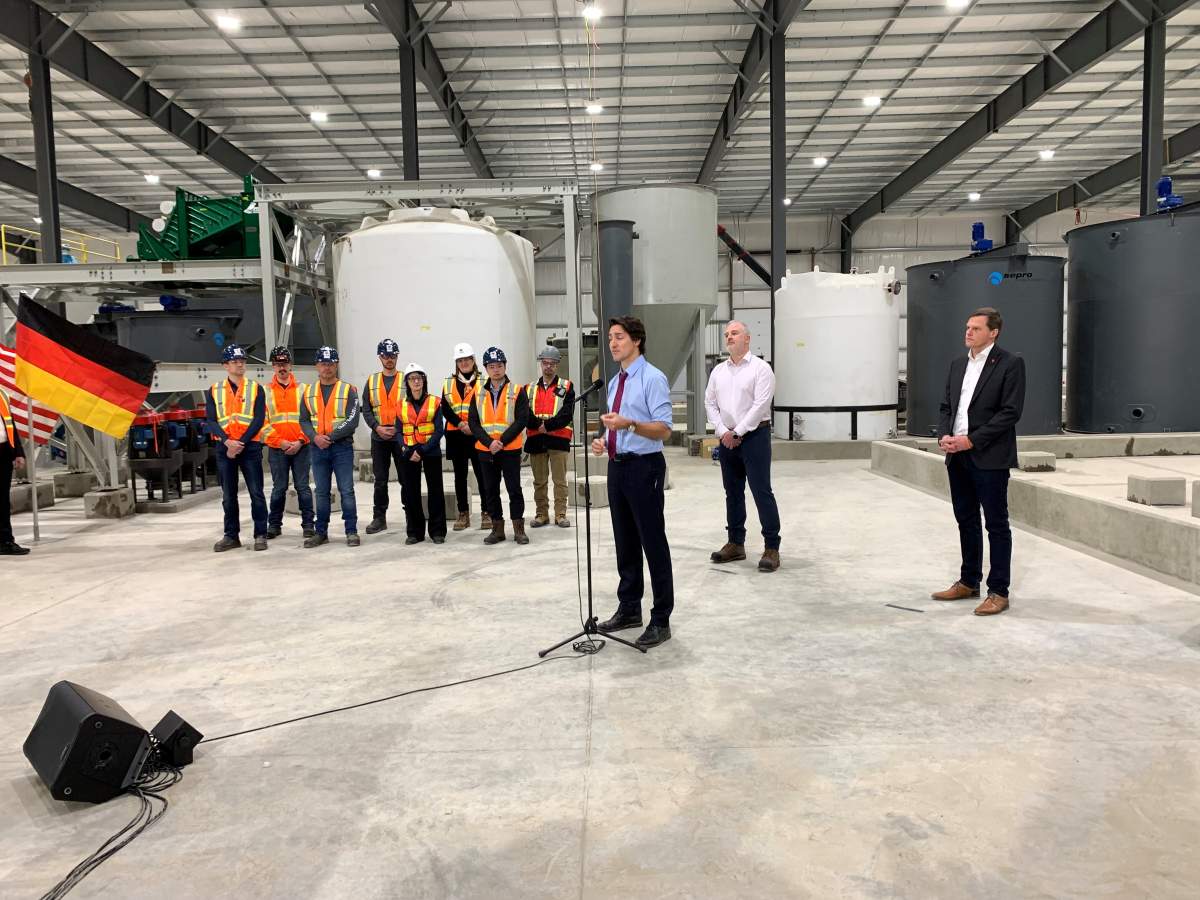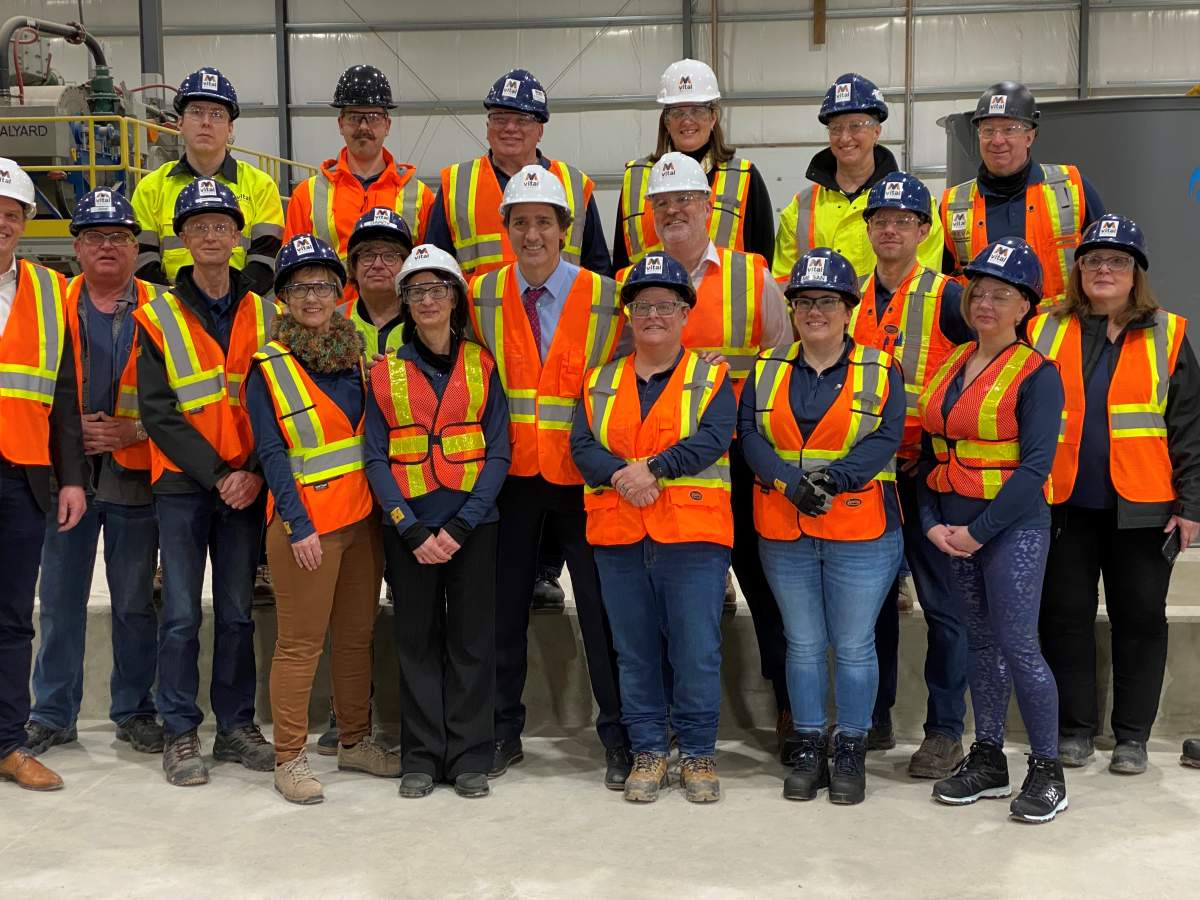Prime Minister Justin Trudeau was in Saskatchewan on Monday morning to visit the Vital Metals rare earth element processing plant.

Saskatoon’s Mayor, Charlie Clark, was also in attendance.
Trudeau said Canada has many of the rare elements that are becoming more and more important for products.
“People don’t just want to be able to build things, they want to be able to build things and say that they’re done with clean steel, clean electricity, clean aluminum, clean critical minerals, done in partnership and with respect with Indigenous Peoples,” Trudeau said.

He added Saskatoon is in a particularly good position to do that.
Trudeau said Canada doesn’t just have the raw materials, but also the workforce to develop them.
He said he’s on a three-day tour to see the battery supply chain in Canada.
Trudeau said there is a support system for rare earth element mining in Saskatchewan, and that mining and processing is done in an environmentally responsible way.
“Environmental responsibility is top of mind. One of the things we’ve consistently heard, whether it’s talking to big companies like Volkswagen, big American companies looking to invest in Canada, they want to know that the processes are as green as possible.”
Trudeau said the supply chain disruptions that have been affecting many countries have created a demand from those countries for Canada to become a supplier of materials.
“There has been an awakening to allies in Europe and the United States and around the world that Canada can and must be an extraordinarily reliable supplier of high-quality ingredients in the economy of tomorrow.
“It’s not just about buying from a reliable ally, it’s about knowing that what happens here; the processes, the extraction and the processing of essential ingredients in our economy of the future is happening by workers who get paid well, where health and safety concerns are top of mind, where environmental consequences are thought through and minimized, where partnerships with Indigenous Peoples aren’t just an add-on at the end, but integrated entirely in our way of doing things.”

Get daily National news
He said demand for green materials is skyrocketing.
John Dorward, president and CEO of Vital Metals, said there are 17 rare earth elements that are found in the products that get shipped to the processing plant in Saskatoon.
“The two primary ones that are of the most interest — neodymium and praseodymium — and the primary use of those is in electric motors,” Dorward said.
He said powerful magnets are created from those elements.
A test run back in August to create rare earth element ingots in Canada using the Saskatchewan Research Council’s (SRC) rare earth processing facility was successful.
The SRC noted the rare earth processing facility will have the capability to produce enough magnets to produce up to 300,000 electric vehicles per year.
According to the SRC, these ingots are the first rare earth element ingots produced in Canada.
The Government of Saskatchewan said this three-stage rare earth processing facility will be the first of its kind in North America, and products from the facility will be available for sale internationally in 2024.
Ken Coates, professor at the Johnson Shoyama Public Policy School, said that Canada is already behind in the rare element business due to mining restrictions.
“If you finish late, third or fourth, you’re kind of out of the game almost altogether. So, we have to move quickly. The irony here, of course, is that the federal government has put in some very, very tough regulatory requirements,” Coates said.
“The federal government has made building mines in Canada extremely difficult. I hope the federal government looks back at its own regulatory framework and says, ‘how do we expedite this?'”
Premier Scott Moe said he was disappointed to find out about the visit, noting he wasn’t aware that Trudeau was coming.
“It’s disappointing because this is an area that the provincial and federal governments see eye to eye on, yet we were not aware of the prime minister’s visit. Saskatchewan has been advocating for increased investment in this area, and we hope that the prime minister will have positive news today — and into the future — on our applications before Natural Resources Canada,” Moe said Monday.
“It’s not surprising as I led a Saskatchewan delegation in Washington, D.C., last month, where I met with various levels of President Biden’s administration and discussed the opportunities Saskatchewan has to partner with the USA on providing the elements required for North American energy security. It’s also not surprising that one of the prime minister’s first visits following his meetings with the American and Mexican presidents is to a Saskatchewan facility, as our province is a global leader in critical minerals and rare earth elements.”
“I welcome Prime Minister Trudeau to Saskatchewan, and hope that he recognizes Saskatchewan’s potential in not only making a stronger Canada but a stronger North America during his time in our province today.”
Moe also held a media scrum at the Saskatchewan legislature after Trudeau’s announcement, further talking about his disappointment due to this being an area where both the provincial government and federal government saw eye to eye.
He noted that the plant is coming up to the Phase 2 portion of development and was hoping to have the feds as a partner in funding for that development.
“It just seems a bit gratuitous that the prime minister wouldn’t be willing to share the platform with the premier or at least one of his ministers, seeing that this is in fact a collaborative venture,” said Coates.
Moe added he received an apology from Trudeau’s office.
“We have numerous policy points where we don’t agree with the direction of the federal government, we let that be known. But there are numerous opportunities where we have to really work together with the federal government.
“I don’t think there’s actually a problem with the relationship between the government of Saskatchewan and the government of Canada, because that relationship is very much issues-based, from our perspective.”
He said there were a number of missed opportunities for conversations developing these industries further.
“Here’s my commitment: when I go to Ottawa, I let the prime minister know I’m going to be in Ottawa. He can do the same.”

NDP Opposition leader Carla Beck responded to Moe’s statement, noting that people have “grown tired of politicians – at all levels – stoking division.”
Trudeau also responded to Moe’s statement, saying they’ve had many opportunities to make announcements with the Saskatchewan government.
“The government of Saskatchewan is an important partner on many different issues, at the same time we also know there’s work to be done on encouraging the government of Saskatchewan to see the opportunities that companies and workers are seeing in cleaner jobs and the opportunities for cleaner energy projects.”
While Trudeau did offer his condolences to First Nations communities after 2,000 anomalies and a fragment of a child’s remains were found at Lebret Indian Residential School during Monday’s press conference, Federation of Sovereign Indigenous Nations Chief Bobby Cameron noted his disappointment in the lack of a visit from the Prime Minister, adding that Trudeau is “without the decency to pay his respects in person to Star Blanket.”
Trudeau was also peppered with questions about health care, guns and bail systems.













Comments
Want to discuss? Please read our Commenting Policy first.